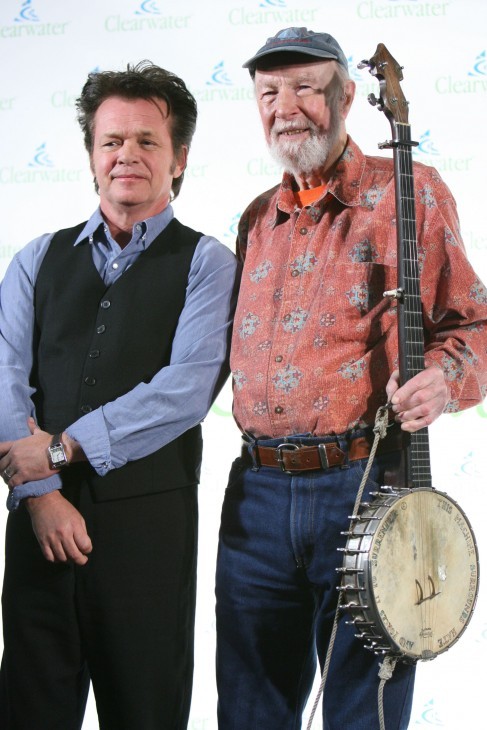Pete Seeger is definitely one of Those Guys: the ones you think you know well, but then when they die you learn “Oh, he did that and that AND that?”
Mr. Seeger was 94 when he died yesterday in a New York hospital. He had still been living in his log cabin overlooking the Hudson River, the one he built after paying $1700 for 17 acres in the 1940s. (“He was chopping wood 10 days ago,” his grandson reports.) His NY Times obituary is a good place to start, and the local Poughkeepsie Journal has plenty more.
Turns out the songs we sang at church camp in the 1970s were pretty much a lineup of Pete Seeger’s greatest hits: If I Had a Hammer, Where Have All the Flowers Gone and then We Shall Overcome, which was a dependable weepy campfire closer. Goodnight, Irene I learned at home. (He learned it from Lead Belly, as he always pointed out.)
At the time, of course, I didn’t know that all those songs came from one guy, or that he’d been blacklisted as a Communist in the 1940s and 1950s.
Every time an obituary mentions the House Un-American Activities Committee, I shake my head in disgust. A bunch of small-minded goofs who did their best to wreck the lives of some pretty good Americans, from guys like Pete Seeger to war-winning heroes like J. Robert Oppenheimer. (It’s all too easy to look at Congress today and pick out the 10 guys who would be cheerleading for a modern-day HUAC.)
Pete Seeger came out of it all with his dignity intact, testifying:
“I feel that in my whole life I have never done anything of any conspiratorial nature… I am not going to answer any questions as to my association, my philosophical or religious beliefs or my political beliefs, or how I voted in any election, or any of these private affairs. I think these are very improper questions for any American to be asked, especially under such compulsion as this.”
Right on. He was indicted for contempt of Congress and sentenced to a year in prison, but the charges got thrown out.
Here’s another tune I hadn’t heard: If You Miss Me at the Back of the Bus.
If you miss me at the back of the busyou can’t find me nowherecome on over to the front of the busI’ll be riding up there.…If you miss me in the cotton fieldsyou can’t find me nowherecome on over to the courthouseI’ll be voting right there.
Good stuff. (I know, I know, I should know all about this already.)

Another new (to me) fact: in 1966, “in despair over the pollution of his beloved Hudson River,” Pete Seeger led the push to fund and build the Hudson River Sloop Clearwater. It became a symbol of the young environmental movement, and in 2004 was named to the National Register of Historic Places for its powerful role.
(As The Times notes, General Electric finally agreed in 2009 to dredge up the 1.3 million pounds of PCBs it had dumped into the Hudson from 1947-77 — a deal forced by decades of litigation and activism led by Seeger’s HRS Clearwater group. Ha!)
Still other things I didn’t know about Pete Seeger:
» He was married for nearly 70 years to Toshi Aline Ohta, a Japanese-American woman he met at a square dance in 1938. They married in 1943 and she died last year.
» He rambled across the country with Woody Guthrie in 1940, and “hopped freight trains by himself, trading and learning songs.”
» He helped found the Newport Folk Festival in 1959.
» He sang This Land is Your Land with Bruce Springsteen at Barack Obama‘s 2009 inaugural. (OK, I guess I remember this part.)
And he said, “The key to the future of the world is finding the optimistic stories and letting them be known.”
Amazing years, amazing life. Thanks for all the campfire songs, Mr. Pete!
Pete Seeger, Songwriter and Champion of Folk Music, Dies at 94 »
